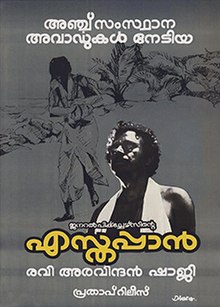Esthappan
| Esthappan | |
|---|---|
 Poster | |
| Directed by | G. Aravindan |
| Written by | G. Aravindan |
| Produced by | K. Ravindran Nair |
| Starring | Rajan Kakkanadan Krishnapuram Leela Sudharma Shobhana |
| Cinematography | Shaji N. Karun |
| Edited by | G. Aravindan |
| Music by | Janardhan G. Aravindan |
Production company | General Pictures |
Release date |
|
| Country | India |
| Language | Malayalam |
Esthappan is a 1980 Malayalam film written and directed by G. Aravindan. Aravindan also co-composed the music and edited the film. Rajan Kakkanadan, Krishnapuram Leela, Sudharma and Shobhana form the cast. It won the Kerala State Film Awards for Best Film and Best Director.
Plot
[edit]Esthappan, a fisherman lives in a seashore colony of fishermen.
The first sequence of Esthappan is a long shot of Esthappan walking by the seashore, which creates an illusory feeling that he is walking over the waves and crossing the sea. Esthappan's miraculous acts like printing his own money and drinking whisky without getting drunk are narrated by people. He is described as a prophet, miraculous healer, thief and charlatan by different people. Finally when the disappearance of Esthappan from the colony creates concern among fellow fishermen, the priest of the church consoles them that Esthappan would definitely come back.
Cast
[edit]- Rajan Kakkanadan
- Krishnapuram Leela
- Sudharma
- Shobhana
- Gemini Ganesan
Critical commentary
[edit]The character of Esthappan is always engaged in all sorts of things (in a moral way) to make people remind of Christ. The fishermen community of the place works (different sorts of ‘acts’) so hard and so do all other men and women of the locality. Yet the greatness of their acts is lost once the same community indulges without any moral concerns, in immoral and illegal acts. They lose the greatness of their effort (acts) through excessive drinking, gossiping, being promiscuous and through exploiting each other in many ways. This reprobate state of the people is what drives Esthappan to do what he does. He, who was once a fisherman now does no work other than doing things that will remind the people of Christ. He thinks that to work without a philosophy, is a waste. Therefore, his attempt is at the heart of the people who have forgotten Christ. In order to do that he comes to help people from diseases, from false acquisitions, from debt, from dangers etc. like Christ did. But his constant worries and thoughts while doing all these suggest us that he is not satisfied from these external acts alone. He is worried more about getting into the hearts of people where lay the real problem; the question of morality and conscience. Esthappan is not against established dogmas of the Church or against the practices of her. His attendance of mass celebrated in the church and his asking for the incenses are examples for this.
References
[edit]- "Aravindan's profile". India Film database. Retrieved 11 April 2011.
- Sashi Kumar (2–15 January 2010). "Aravindan's art". Frontline. Archived from the original on 20 October 2010. Retrieved 11 April 2011.
